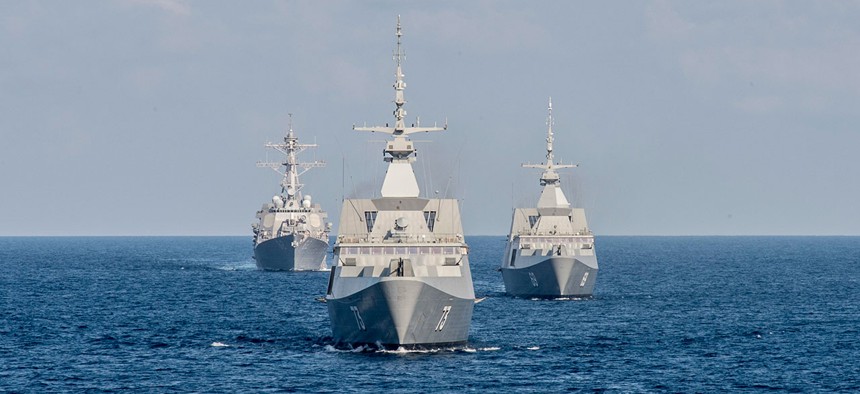
The Republic of Singapore Navy’s RSS Intrepid (69), right, RSS Supreme (73), center, and the U.S. Navy destroyer USS Lassen (DDG 82), left, during a military drill in the South China Sea. Mass Communication Specialist 2nd Class Joe Bishop/Navy
Top Admiral Asks U.S. Allies to Help Buzz China’s Fake Islands
The four-star admiral of U.S. Pacific Command told Congress he wants other countries to join the U.S. in flying, sailing near China’s new islands (and that new radar).
Washington’s allies could soon join the U.S. military in sending naval ships and warplanes near China’s now-militarized man made islands in the South China Sea, the top American commander in the Pacific said.
Adm. Harry Harris, commander of U.S. Pacific Command, said America’s allies in the region have been supportive of the Pentagon’s ships and planes that have sailed and flown through the region over the past year.
“It would be helpful and I've encouraged other countries to conduct operations in the South China Sea because, at the end of the day, the South China Sea is international waters in my view,” Harris said at a Senate Armed Services Committee hearing Tuesday.
Beijing has called on the U.S. to stop what the Pentagon calls freedom of navigation missions. Washington does not recognize China’s claims to the man made islands.
Without naming specific countries, Harris said some governments “are willing to consider doing [these missions] with us." Others will not participate because they don’t have the ships or planes, or due to “internal politics” or “their relationship with China.”
China has continued to militarize the islands with reports surfacing this week that radars were being installed in the Spratlys. Last week China reportedly deployed a surface to missile launcher in Woody Island, one of the many disputed pieces of land in the region.
But the radar facilities “could significantly change the operational landscape in the South China Sea,” the Center for Strategic and International Studies’ Asia Maritime Transparency Initiative wrote in a posting featuring new satellite images of the island's possible radars.
“[P]lacement of a high frequency radar on Cuarteron Reef would significantly bolster China’s ability to monitor surface and air traffic coming north from the Malacca Straits and other strategically important channels,” the group said.
China also built a 10,000-foot airstrip on Fiery Cross Reef, where it landed commercial jetliners earlier this year.
“[T]hese are actions that are changing in my opinion the operation of the landscape in the South China Sea,” Harris said of the missiles on Woody Island, the radars on Cuarteron Reef and runways on Subi Reef and Fiery Cross Reef.
The Navy has flown an intelligence plane and sailed a destroyer near the islands over the past year. The Defense Department said two B-52 bombers mistakenly flew over one the artificial islands in November.
“[T]his is international water and international airspace, and if we don't exercise our rights or if those rights aren't routinely exercised by someone, then we stand a chance of abdicating those rights to someone else,” Harris said. The regular exercise of freedom of navigation, in my opinion, is critical. It's important. And it's something that we must continue to do.”







